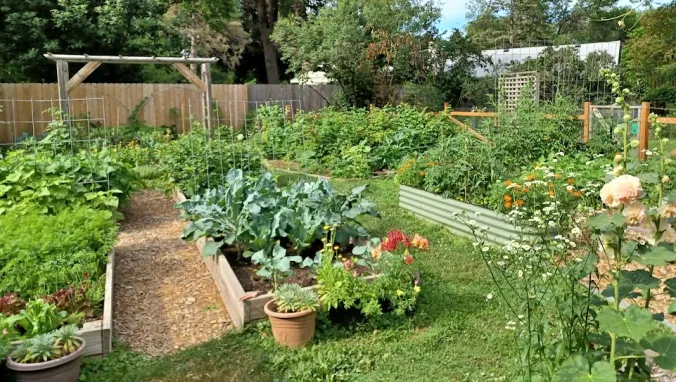What Happens When We Dig In
Last month, I did something that felt both completely natural and slightly revolutionary: I spent an entire Saturday morning with my hands in the dirt, planting seeds that won’t produce anything I can harvest for months. It’s interesting to consider what happens when we dig in and commit to the slow process of growth.
In our instant-gratification, Amazon-Prime-delivery world, this kind of delayed reward system seems almost quaint. Plant a seed in April, maybe get a tomato in August? Who has time for that when you can just order whatever you need and have it delivered tomorrow?
But here’s what happened during those four hours in the garden that no amount of online shopping could ever provide.
My brain slowed down. The endless mental chatter that usually bounces around my head like a pinball machine gradually quieted to a whisper. My breathing deepened. My shoulders, which are perpetually hunched from too much computer work, finally settled into their proper position.
I remembered what it feels like to be a human being instead of a productivity machine.
This is what happens when we dig in—literally and metaphorically. When we commit to something that requires patience, presence, and physical engagement with the real world instead of the digital one.
But it goes deeper than just the therapeutic benefits of gardening, though those are real and well-documented.
We remember that we’re animals who evolved to work with our hands.
Our ancestors spent thousands of years planting, tending, harvesting, building, creating, and shaping the physical world around them. Our brains and bodies are literally designed for this kind of work. When we spend all our time pushing buttons and staring at screens, we’re going against millions of years of evolutionary wiring.
No wonder so many people feel anxious, depressed, and disconnected. We’re asking our Stone Age brains to thrive in a completely artificial environment, then wondering why we feel off-balance and unfulfilled.
We remember that the best things take time.

In the garden, you can’t rush the process. You can provide optimal conditions—good soil, adequate water, proper spacing—but the actual growth happens on nature’s timeline, not yours. This enforced patience is incredibly valuable in a culture that promises instant everything.
When you plant seeds, you’re making a bet on the future. You’re saying, “I believe that if I do this work now, something good will happen later, even though I can’t see any evidence of it yet.”
That’s a radical act of faith in our immediate-gratification world.
We remember that we’re capable of creating things, not just consuming them.
Most of us have become professional consumers. We consume entertainment, consume food, consume information, consume products, consume experiences. But humans are supposed to be creators too. We’re supposed to make things, build things, grow things, fix things.
When you grow your own food, even if it’s just a handful of herbs on a windowsill, you’re participating in creation instead of just consumption. You’re taking raw materials—seeds, soil, water, sunlight—and transforming them into something useful and beautiful.
This is deeply satisfying in ways that buying things never can be.
We remember that we’re part of something bigger than ourselves.
Working in the dirt connects you to the soil ecosystem, to the seasons, to the weather, to the insects and birds and all the other creatures that share your space. You start to understand that you’re not separate from nature—you’re part of it.
This connection is something our ancestors took for granted but that most modern people have completely lost. We live in climate-controlled boxes, eat food from thousands of miles away, and interact mainly with artificial environments.
No wonder we feel isolated and disconnected. We’ve literally disconnected ourselves from the web of life that we’re supposed to be part of.
We remember that meaningful work feels different than busy work.
There’s a quality to work that produces something real and useful that’s completely different from the abstract, digital work that most of us do for a living. When you plant seeds, tend plants, and harvest food, there’s a direct connection between your effort and a tangible result.
This is incredibly grounding and satisfying. Instead of wondering whether your work matters, you can see the literal fruits of your labor growing in front of you.
This is why so many people find gardening, woodworking, cooking, and other hands-on activities therapeutic even when they’re challenging and sometimes frustrating.
We remember that our bodies are designed to move.
Modern life has turned most of us into sedentary creatures who get our exercise by going to gyms to do artificial movements that simulate the real work our ancestors did every day. But when you’re digging, planting, weeding, and harvesting, you’re getting natural movement that engages your whole body in functional ways.
This is the kind of physical activity humans are designed for, and it feels completely different than forcing yourself through a workout routine.
We remember that seasonal rhythms matter.
When you grow your own food, you can’t ignore the seasons. You plant according to when the soil is ready, not when it’s convenient for your schedule. You harvest when the plants are ready, not when you feel like it.
This connection to natural cycles is something most people have completely lost. We live in artificially lit environments, eat the same foods year-round regardless of season, and organize our lives around arbitrary schedules that have nothing to do with natural rhythms.
But seasonal living creates a sense of anticipation, gratitude, and connection that year-round sameness never can.
So when we dig in? When we choose the slower, more hands-on, more connected way of doing things instead of the fast, convenient, artificial alternatives?
We remember who we are underneath all the modern conditioning.
We remember that satisfaction comes from engagement, not entertainment. That fulfillment comes from creating, not consuming. That peace comes from slowing down, not speeding up.
We remember that being human is supposed to feel different than this.

And once you remember, it’s hard to go back to unconscious consumption and digital distraction. Once you’ve felt the satisfaction of growing your own food, the peace of working with your hands, the connection that comes from engaging with the real world, everything else starts to feel a little hollow.
This is why people who start gardening often become obsessed with it. It’s not just about the vegetables—it’s about reclaiming their humanity.
So dig in, literally or metaphorically. Find something that connects you to the physical world, that requires patience and presence, that creates something real and useful.
Your Stone Age brain will thank you. And you might just remember what it feels like to be fully, deeply, authentically human.

Leave a Reply